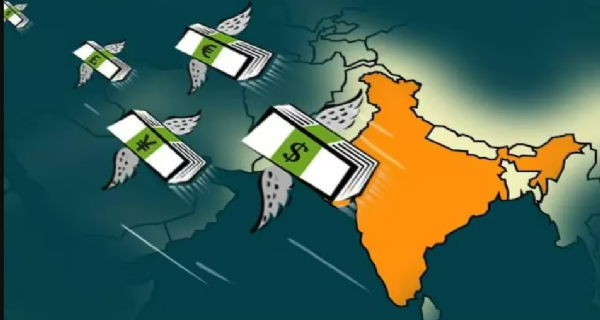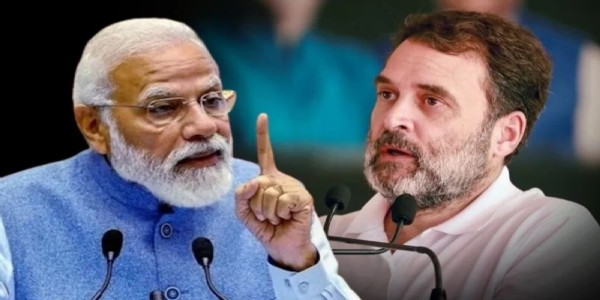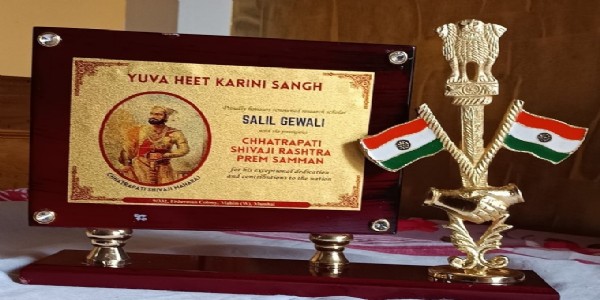Regulating Narrative Influence: How Foreign-Funded NGOs Are Shaping Indian Public Opinion
As India’s digital ecosystem evolves, a new form of influence is quietly taking root — not through mainstream media, but via certain non-governmental organisations (NGOs) operating under the guise of advocacy and research. These entities, often supported by foreign funding, increasingly blur the lines between activism, journalism, and agenda-driven content. In some instances, NGOs have been found disseminating misinformation to advance anti-India narratives, prompting regulatory scrutiny.

The recent amendment to the Foreign Contribution (Regulation) Act (FCRA) reflects the Indian government’s growing concern over the foreign-funded NGOs shaping public discourse — and the geopolitical interests they may represent.
This article critically examines the implications of such foreign-funded influence on national sovereignty, public opinion, and the regulation of civil society.
In the age of social media, viral videos, and self-published “research,” a new breed of news is emerging — not from traditional newsrooms, but from within the ecosystem of non-governmental organisations (NGOs). While many claim to fill the gaps left by mainstream journalism, a subset of these organisations is leveraging digital platforms to spread misinformation and subtly shape public opinion under the pretext of independent research. These efforts are often underwritten, and sometimes ideologically influenced, by foreign donors.
A prominent example is the Centre for Policy Research (CPR), a Delhi-based think tank headed by the daughter of former Congress politician Mani Shankar Aiyar. Long regarded as an independent, non-partisan research institution, CPR came under scrutiny when the Ministry of Home Affairs (MHA) suspended — and subsequently cancelled — its Foreign Contribution (Regulation) Act (FCRA) registration. The MHA cited multiple violations, including the diversion of foreign funds, the publication of donor-funded policy content that resembled news, and activities deemed contrary to India’s economic interests. The CPR case has ignited a broader debate: Should foreign-funded entities be permitted to influence public discourse under the cover of research and advocacy?
Recognising the growing challenge of foreign influence in shaping public discourse, the Government of India has taken a decisive step. On May 26, 2025, the Ministry of Home Affairs (MHA) issued a new notification under the Foreign Contribution (Regulation) Act (FCRA), 2010. Targeting NGOs involved in publication-related activities, the amendment draws a firm line: foreign contributions must not be used to influence news content or sway public opinion in India.
What changed — in simple terms
The Indian government has recently tightened regulations governing NGOs that seek foreign funding. Under the updated provisions of the Foreign Contribution (Regulation) Act (FCRA):
- NGOs engaged in publishing news or any newspaper are barred from receiving foreign contributions.
-
NGOs must now obtain a certificate from the Registrar of Newspapers for India (RNI), confirming they are not involved in news publication.
The Other Implications
NGOs now need to prepare detailed financial statements, and CA-certified reports, and get a donor commitment letter matching the actual fund usage plan.
- They must also follow FATF (Financial Action Task Force) guidelines related to anti-terror funding and money laundering.
-
20% of foreign funds can be used for administrative expenses (salaries, rent, etc.)
NGOs whose FCRA licence has expired or was cancelled must now submit affidavits and detailed usage reports to reapply.
Which types of NGOs in India might be affected:
-
Media-Linked NGOs: NGOs that publish news bulletins, opinion pieces, fact-checks, or run independent journalism platforms.
-
Rights-based NGOs: Organisations that campaign for human rights, environmental justice, tribal rights, etc., and use newsletters or reports as tools for public awareness.
-
Think tanks and research bodies: Those who publish policy analysis, white papers, or journals could be indirectly affected if the content is seen as news-related.
- Education NGOs with media outreach: NGOs involved in educational awareness through blogs, periodicals, or radio shows could also be scrutinized. These regulatory measures reflect a growing effort to safeguard the integrity of India’s information space from foreign influence disguised as civil society activism or policy research.
The nexus of NGOs, news, and foreign funding
Traditionally seen as charitable institutions, a section of NGOs in India have evolved over the past decade into narrative-driving entities — publishing reports, blogs, and video content that blur the lines between activism and journalism. While this shift is not inherently illegal, the real concern arises when such activities are fueled by foreign funding, often aligned with specific propaganda interests.
As many as 86 media outlets and journalists received USAID funding to push anti-India narratives. Investigations also point to how USAID-funded Organised Crime and Corruption Reporting Project (OCCRP) reports have been leveraged during key political moments to target Indian businesses including the Adani Group and disrupt parliamentary processes — potentially destabilising the economy and national unity.
Apart from this, the Income Tax Department and the Supreme Court have also flagged concerns surrounding such NGOs. They have stated how some of these actions may be driven by external powers, working in concert with NGOs to obstruct development—raising concerns about national interest being compromised.
The MHA has earlier called such tactics the work of “Front Organisations” — groups that appear harmless but actually push hidden agendas. They often use issues like tribal rights or the environment to hide their real motives. These groups not only influence narratives but strategically use legal and media platforms to weaken enforcement, further amplifying foreign ideologies that may conflict with India’s developmental goals.
| NGO/Entity Name | Alleged Activities/ Narrative Influence | FCRA Status/Outcome |
|---|---|---|
| USAID-funded Media Outlets/ Journalists | Spread "anti-Indian narratives" in publications; OCCRP used as "ammunition" against Indian business tycoons/government to create instability | Facing scrutiny, government concern over foreign interference |
| Oxfam India | Supported anti-Adani campaign; aimed to "delist Adani Ports" as part of a "sinister plan" to target Indian business | Licence renewal denied; operations halted; CBI investigation initiated |
| Centre for Policy Research (CPR) | Transferred foreign contributions to other entities; deposited funds in non-designated accounts; policy reports equated with current affairs programming for "undesirable purposes" | Registration cancelled |
| Legal Initiative for Forest and Environment (LIFE) | Received foreign funds to "target and stall coal projects," harming India's "national economic security"; used litigation as a tactic | CBI investigation initiated for FCRA breach |
| Environics Trust | Allegedly funded local protests against industrial projects (e.g., JSW steel plant); involved in "concerted efforts" to halt projects | Facing legal scrutiny |
| Care India Solutions for Sustainable Development | Allegedly involved in "concerted efforts" to support protests and halt projects | Facing legal scrutiny |
| Greenpeace India | Accused of using foreign funds to undermine India’s economic interests through environmental activism and targeted media campaigns | Faced FCRA restrictions; operations significantly curtailed |
| NewsClick | Digital news platform allegedly supported anti-national narratives through foreign funding; subject to raids and investigation | Facing FCRA scrutiny; funding sources under probe |
| Sabrang Trust | Run by activists Teesta Setalvad and Javed Anand; flagged for alleged misuse of foreign contributions and controversial activism | Subject to FCRA action; funds under government scanner |
This evolving dynamics underscores the need for tight regulatory oversight, as attempted through the recent FCRA amendment, to ensure that external powers do not covertly shape India’s information ecosystem.
Why it Matters: Information Warfare and the Indian Mind
Modern conflicts are no longer fought only on battlefields. Today’s wars are fought also in the minds of people. And in this new era of hybrid warfare, information is both the bullet and the battleground.
Foreign-funded NGOs involved in publishing content on Indian politics, judiciary, environment, or security often walk a tightrope. Many have published reports or videos questioning government action in conflict zones, discrediting Indian institutions, or amplifying separatist voices. Such narratives are often timed strategically—just before elections, during crises, or in sync with foreign media reports. These are not isolated incidents. They are part of a pattern—one where India’s image, policy, and strategic choices are constantly put on trial in its backyard, using foreign funds and indigenous faces.
- Unchecked, such narrative shaping can lead to:
- Erosion of public trust in institutions,
- Weakening of democratic consensus,
-
Amplification of divisive voices from abroad.
The FCRA amendment does not criminalise content. It merely demands honesty and transparency about who funds it—and for what purpose. In doing so, it strengthens India’s information sovereignty.
A look at the global context
India’s move is not an anomaly. Many countries have similar or even stricter regulations:
| Country | Key Law / Policy | Scope and Restrictions | Target Areas | Comparison with India’s FCRA (2025 Amendment) |
|---|---|---|---|---|
| United States | Foreign Agents Registration Act (FARA) | Requires registration of individuals or entities acting "on behalf of" a foreign principal to influence US public opinion, policy, or law. Covers lobbying, PR, media, and legal efforts. | Lobbyists, PR firms, NGOs, media, think tanks | Like FCRA, FARA demands disclosure but extends to individuals and content creators. Labeling requirements can impact credibility. |
| Russia | Foreign Agent Law (2012, amended) | Mandatory registration as "foreign agents"; broad definition of “political activity”; heavy reporting, labeling, fines, asset freezes, and criminal charges. | NGOs, media, education, activism | Far stricter than India. Uses stigmatising labels and sweeping definitions. |
| China | Law on Administration of Overseas NGOs (2017) | Foreign NGOs must register with police; must partner with Chinese orgs; political/religious activity banned; tight funding control. | All NGO activities, especially rights-related | Extremely tight state control. India allows operational independence with oversight. |
| Georgia | Foreign Agent Law (2023–24) | Foreign-funded orgs (>20%) to register as “pursuing foreign interests”; included criminal penalties; public protests blocked passage. | NGOs, independent media | More aggressive than India’s law. FCRA focuses on compliance, not branding NGOs as foreign agents. |
| Israel | NGO Transparency Law (2016) | NGOs with >50% foreign government funding must disclose in all communications and reports. | Human rights NGOs, mostly EU-funded | Comparable to India’s FCRA in transparency aims. Narrower scope, targeted at state funding. |
| Australia | Foreign Influence Transparency Scheme (FITS) (2018) | Registration required for those acting on behalf of foreign principals for political influence. Disclosure-focused, not restrictive. | Advocacy, lobbying, communications | Similar in spirit to India’s amendment. The focus is on public disclosure, not bans. |
Therefore, India’s amendment simply places the country in line with global best practices in shielding democratic spaces from covert influence.
In a world where narratives are weaponised, information is power. And that power must not be for sale to the highest foreign bidder. This amendment reaffirms a simple principle: India must speak with its voice. As NGOs continue to do valuable work, this reform ensures that those who choose to also play in the domain of public opinion and media do so with clarity, honesty, and accountability. Because in the fight to protect the truth, the first line of defence is knowing who’s writing the story — and why.
Bharati Web








